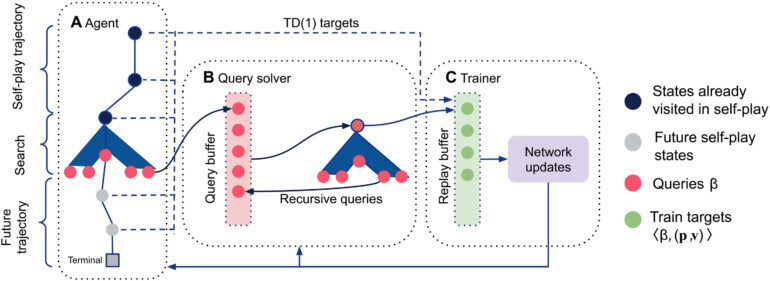TL;DR:
- The collaborative AI team introduces the “Student of Games” (SoG) AI system, developed with DeepMind’s involvement.
- SoG excels in various games and demonstrates the ability to learn and conquer new challenges.
- Machine learning and artificial intelligence have evolved significantly, finding applications in gaming.
- Teaching a computer to excel in board games signifies a milestone in AI development.
- SoG stands as a remarkable step toward artificial general intelligence (AGI), with its capacity to perform superhuman tasks.
- Traditional AI systems focus on single games, but SoG is adaptable across diverse games.
- SoG masters games with perfect and imperfect knowledge, outperforming human experts.
- It has defeated AI systems and humans in Go, chess, Scotland Yard, and poker.
- SoG’s adaptability suggests it can learn and excel in virtually any game.
Main AI News:
In the realm of artificial intelligence and game mastery, a consortium of AI luminaries, including EquiLibre Technologies, Sony AI, Amii, and Midjourney, in collaboration with DeepMind, the pioneering brainchild of Google, unveils a groundbreaking creation: the Student of Games (SoG) AI system. This formidable AI marvel not only reigns supreme in a multitude of games but also possesses the extraordinary ability to learn and conquer new gaming challenges. The details of this remarkable innovation are illuminated in this exclusive report.
Over the last five decades, the field of computer science has witnessed the evolution of machine learning and artificial intelligence, where the power of human-generated data is harnessed to train computational systems. Within this technological landscape lies the domain of gaming, both board and parlor, which serves as a proving ground for the prowess of AI.
Training a computer to excel at a board game and subsequently elevating its prowess to surpass human abilities stands as a significant milestone in the journey of artificial intelligence. It serves as a testament to the remarkable progress achieved in the field. In this pioneering study, the collaborative research team takes a stride closer to realizing the dream of artificial general intelligence—a realm where computers wield abilities akin to those deemed superhuman.
Traditionally, computer systems designed for board games have specialized in mastering a single game, be it chess or another. In doing so, they have manifested a particular form of constrained artificial intelligence. However, in this ambitious endeavor, the research consortium has engineered an intelligent system endowed with the remarkable aptitude to engage in a diverse array of games, each demanding unique sets of skills.
Within the sphere of game playing, two predominant categories emerge: those with perfect and those with imperfect knowledge. The former encompasses games where both players possess complete awareness of all game components, including the placement of every game piece. On the other hand, the latter category includes games like poker, where individual players have partial knowledge of the game’s intricate details. Astonishingly, SoG demonstrates its dominion over both types of games, consistently outmatching even the most proficient human adversaries.
The illustrious track record of SoG extends to victories over other AI systems and human competitors in games as complex and diverse as Go, chess, Scotland Yard, and Texas Hold ’em poker. Moreover, the research team posits that its adaptability and capacity for self-improvement render it eminently capable of mastering virtually any game it encounters. The era of versatile and adaptable artificial intelligence in gaming has dawned, marking a significant stride towards the ever-elusive goal of artificial general intelligence.
Conclusion:
The introduction of DeepMind’s SoG AI system represents a pivotal moment in the world of gaming and artificial intelligence. Its adaptability, versatility, and capability to outperform human experts in various games signify a significant leap toward the realization of artificial general intelligence. This innovation has the potential to disrupt the market by offering adaptable AI solutions that can excel in diverse gaming scenarios, opening new avenues for entertainment, education, and problem-solving applications.

